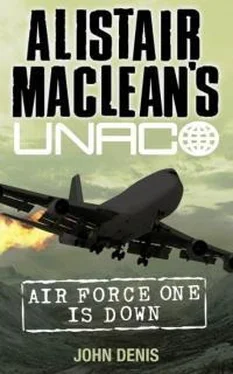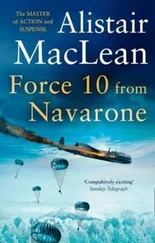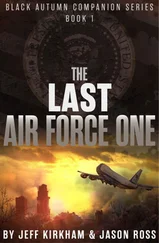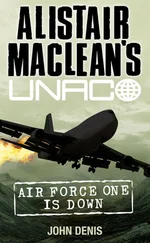There could be no mistaking the size, the conformation, the livery of the plane – the stars and stripes on the flag, the Presidential insignia, the ‘United States of America’ legend – nor the white fuselage, the blue-black nose and pale-blue underbelly and engine-cowlings, perched on the silver wings.
It was Air Force One. Or at least, as with Jagger’s resemblance to Joe McCafferty, to all intents and purposes it was Air Force One.
Which was good enough for Mister Smith, seated in his car at the seaward end of the runway, watching the mighty liner speed towards him preparing to take off.
Finding the airstrip – miraculously built in 1944 to a length of 4500-plus feet for the newly launched German ME262 jet-fighters – had been the first vital contribution of the Russians when Smith had invited the KGB into a tenuous partnership. For the airstrip – long since abandoned and overgrown – was on the flat, low-lying Dalmatian coast of Yugoslavia between Zadar and Sibenik, and Smith had become convinced early on in his planning that the theft of the President’s Boeing could only be achieved from an Eastern bloc state. And even post-Tito Yugoslavia was closed territory to Smith.
But not to the Russians. They had been able both to locate the sort of runway he needed, and to provide the help he would require to clear it and man it. The vehicles on the runway, and the men in their driving-seats, plus the sentries who even now guarded the real Joe McCafferty in Bahrain – they were all recruited from the same ultra-Left partisan group whose headquarters were in the nearby mountains.
Set up and funded by the KGB, they were pledged to return Yugoslavia to the orthodox Communist fold. By infiltration, acts of terrorism and agit-prop, and intimidation in the classic pattern, they were some way along the road to success. They would also provide the troops Mister Smith would use to keep authority at bay while he carried out the final phase of his plan – the collection of the ransom for the OPEC ministers. Though there had been precious few signs of interference from the authorities so far, Smith thought. The KGB again?
The aircraft had been obtained by Smith legally. It was indeed a Boeing 707, but not what the USAF would call a stratoliner. Instead, he had searched for, and found, an old cargo-freighter, its useful life now almost at an end. She suited Smith’s purpose to perfection; he had bought the plane cheaply, and had her resprayed and painted, though not restructured.
The Boeing passed Smith’s car dragging its gigantic shadow in its wake. The noise was horrendous, starting as a raucous whine and rising through a crescendo to a staccato rattle, then dying out over the water in a series of massive, reverberant booms as the liner left the ground and soared into the night.
Mister Smith stroked the knee of the girl beside him, his willing servant from the castle.
‘Now,’ he said in English, ‘it’s up to the Russians and their clever little friends in Italy. Why don’t we return and await developments, my sweet Branka?’
Apart from her name, the girl hadn’t understood a single word, but she smiled and covered his hand with hers. His intentions were plain enough, anyway …
The man code-named Myshkin paced the radio room in the Soviet Union’s Zurich embassy, listening intently to the running commentary from the operator, headphones clasped to his ears, who was translating from the Serbo-Croat of his informant in Belgrade.
Myshkin looked at his watch, and then met the eye of Axel Karilian, who had been bending over the radio operator, making notes on a pad. Karilian’s thick lips parted in a vulpine smile.
‘Congratulations, Comrade,’ he said, ‘everything is going according to plan … our plan, that is, though Mister Smith is still convinced it’s his.’
Myshkin’s eyelids in their slightly epicanthic folds quivered in agreement. It was a gesture, Karilian had noted, that often passed for extreme enthusiasm in Myshkin. Where other men might practically dislocate their necks in nodding vigorous approval, Myshkin would merely compress his prissy lips and flutter his eyelids. It was an oddly menacing habit; not feminine, as it might sound, but serpentine and secretive.
‘I must confess,’ Karilian admitted, ‘that I don’t much relish the idea of McCafferty being around a minute longer than is necessary for our purposes. He’s a constant threat to us. His capacity for danger will cease only when he is dead.’
Myshkin frowned. ‘I’m half inclined to agree with you,’ he said, ‘but McCafferty knows things which are important to us, both about UNACO, whom we can never really trust though we help support them, and most of all concerning the USAF, the Pentagon and Air Force One.
‘Do you realise what we have done, Axel?’ Myshkin said, his voice rising by a carefully adjusted semi-tone in something dangerously close to excitement. ‘We have captured a full Colonel of the United States Air Force without their actually realising it. We can hold him and milk him dry, and they may never even know we have had him .
‘After all, why should they? He’ll still be with them, effectively, as the sole survivor and undoubted hero of the Air Force One hijack – the man who defeated the master criminal that UNACO couldn’t catch.’
Karilian raised his bushy eyebrows at this.
‘Huh?’ he grunted. ‘Since when did that become part of the plan?’
Myshkin smiled, and not for the first time Karilian felt prickles of fear probing his body like acupuncture needles.
‘Moscow considers it advisable,’ he replied. ‘And why not? Should Smith get in our way, or prove to be an embarrassment, who says he necessarily has to survive? We don’t need him,’ Myshkin went on softly. ‘Jagger will have plenty of assistance, provided by us and responsive to our direction, so that when Smith least expects treachery – at the moment of his seemingly complete triumph – how easy it will be for Jagger to – um – dispose of him, and hand over the ransom to us. I’m sure the KGB will find equally practical uses for it – wouldn’t you say, Axel?’
Axel would. He chuckled warmly. Not because he wanted to, but because he felt he had to.
During the hours he spent in the darkened room, McCafferty had been allowed out only twice: once to relieve himself, and again, as night fell, to walk in the garden, always under heavy escort. Not just human escort, either: the Arab Selim kept an unkempt, savage Alsatian on a thick chain, long enough to wind several times round the man’s waist before clipping on to the collar of the fierce dog.
The villa, Mac saw, was a two-storey house set in its own defined plot of land within the palace grounds. Traffic noise indicated that it must be near a road, and he calculated that the high wall at the end of the garden formed the perimeter both of the villa and of the royal residence. His room – the only one with a barred window – was on the first floor, facing front.
McCafferty had spotted three other bedrooms and two bathrooms, and imagined the usual reception suite on the ground floor. The accommodation fitted the number of men guarding him: one on patrol in the garden, one outside his door – these were both as yet unidentified foreigners – plus Selim and his evil dog, and Dunkels. The guards, Mac thought, probably bunked in together.
However hard he tried, the American could see no way of escape. There were no unplugged loopholes, no weak links. Wearily, despondently, still nursing his cuts and bruises, Mac returned from his second excursion and heard the door of his room double-locked behind him.
Then came another sound – a familiar one but not, he was positive, previously heard by him since his arrival at the villa. The telephone rang in the hall downstairs.
Читать дальше
Конец ознакомительного отрывка
Купить книгу










